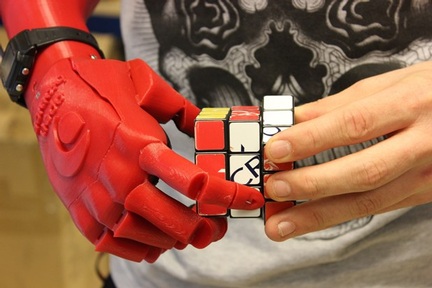3D printed bionic hand for amputees wins Dyson Award
A Plymouth University graduate has been revealed as the latest winner of the National UK James Dyson Award.
Inventor, Joel Gibbard, graduated in 2011 with a first-class degree in BEng (Hons) Robotics and went on to establish his own company Open Bionics, where he designs and creates advanced robotics.
As a result of winning the national award, Mr Gibbard will receive £2,000 which he will use help speed up the prototyping process by buying a new 3D printer: He said: “We’ve encountered many challenges in designing our hands but the reactions of the individuals we help fuels our perseverance to bring them to market. My aim is for Open Bionics to disrupt the prosthetics industry by offering affordable prosthetics for all.”

The innovative prosthetics cost a small fraction of the cost of conventional prosthetics and can be produced with 40 hours, using 3D printing and ‘soft robotics’. The use of this technology allows an entire hand to be printed and assembled using just four manufactured parts, then sold and fitted for less than £2,000.
The new style robotic hands can perform the same tasks as expensive, prosthetics, can offer individual finger movements using electromyographical sensors that’s are stuck to the amputee’s skin.
President of the Royal Academy of Engineering and national James Dyson Award judge, Anne Dowling, said: “I am impressed by how much Open Bionics can improve lives of amputees. By listening to the potential users, Joel is providing the functionality they want at low cost – making appropriate use of technology and 3D printing.”
During the course of his degree, Mr Gibbard was awarded three academic prizes, including the Best Application of Technological Skills award and spent two years working as an engineer with National Instruments before deciding to start his own company and spend time on his invention.
The award, named after Sir James Dyson, who is recognised as one of the greatest living inventors and engineers on an international scale, said: “By using rapid prototyping techniques, Joel has initiated a step-change in the development of robotic limbs. Embracing a streamlined approach to manufacturing allows Joel's design to be highly efficient, giving more amputees’ access to advanced prosthetics.”
Both Open Bionics and the UK national runners-up will now proceed to the next stage of the competition, ‘engineer shortlisting’ which will see engineers from Dyson reduce the 100 entries from around the world down to just 20.
The results will be announced on 17 September 2015 and the international winner will receive £30,000 to develop their invention.
Latest News
 29-Jul-24
Dementia Bus gives carehome.co.uk staff insight into life with dementia
29-Jul-24
Dementia Bus gives carehome.co.uk staff insight into life with dementia
 27-Jul-23
UK's top home care agencies in 2023 revealed
27-Jul-23
UK's top home care agencies in 2023 revealed
 30-Nov-22
A quarter of older people keep their falls secret from family
30-Nov-22
A quarter of older people keep their falls secret from family
 29-Nov-22
'Covid-19 has not gone away' say terminally ill
29-Nov-22
'Covid-19 has not gone away' say terminally ill
 28-Nov-22
IT consultant who received poor care opens 'compassionate' home care business
28-Nov-22
IT consultant who received poor care opens 'compassionate' home care business